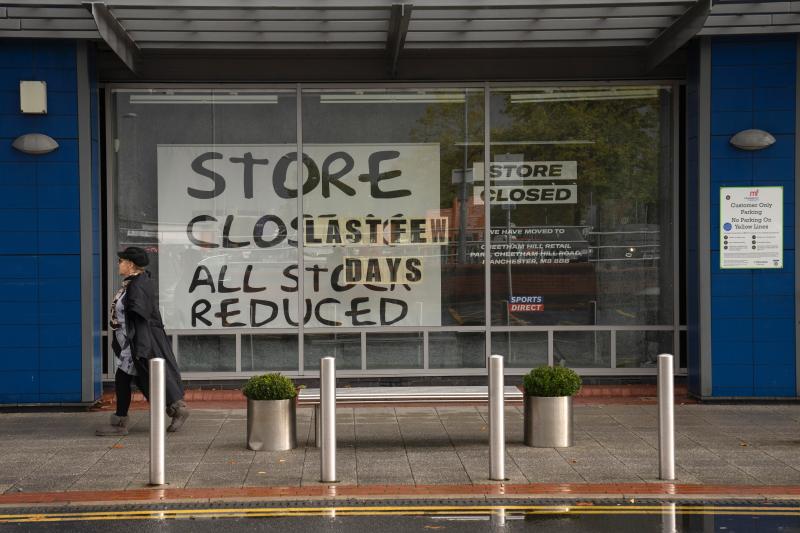Britain now needs stability above all else
- By Tom Fowdy
 0 Comment(s)
0 Comment(s) Print
Print E-mail China.org.cn, October 28, 2022
E-mail China.org.cn, October 28, 2022

On Tuesday, Oct. 25, Rishi Sunak was confirmed as the new prime minister of the United Kingdom. He is the third leader the country has had in a matter of months, after replacing a short and disastrous tenure by Liz Truss that lasted a mere 45 days. She had herself replaced Boris Johnson, who resigned amidst mounting scandals within his government. Sunak subsequently became the first non-white prime minister in the country's history and pledged to be a "unity" leader who would bring the country together and "fix" the mistakes made by his predecessors.
The challenges that Rishi Sunak faces, however, are huge. As he admitted in his opening remarks as prime minister on Tuesday at Downing Street, Britain is facing an economic crisis. The reasons are multi-fold. The Bank of England predicts that the country has already technically entered a "recession," with the value of the pound sinking, inflation surging, incomes falling, and eye-watering energy prices climbing as a direct result of the strikes and industrial unrest that have been growing throughout the country. The media have warned that the U.K. again risks being "the sick man of Europe" in facing such a crisis.
Amidst an enormous deficit of public trust and confidence following last month's events, Rishi Sunak's most immediate priority must be to "stabilize the ship of the state" and rescue the British economy. His policies in turn must be sensible, pragmatic, cautious, and in the best interests of Britain, and stand in stark contrast to the highly ideological "mini-budget" which doomed his predecessor by spooking the markets and crashing the value of the Sterling. Sunak must be prepared to articulate an economy that "works for everyone" and steer the government away from the temptation to pursue nationalist and populist policies that were so frequently depicted by those in office before him.
Key to this effort must be a reorientation of Britain's foreign policy toward reason and rationalism, as opposed to the Neo-Conservative dogma that characterized Liz Truss. A key element of Britain's long-term economic troubles and decline has been the pursuit of a foreign policy increasingly coated with populism, nationalism, and ideology. These were best manifested through the mantra of "Brexit" and "Imperial Nostalgia." Despite Brexit being a self-inflicted wound on the British economy, the Premierships of Boris Johnson and Liz Truss sought to build a foreign policy under the description of a "Global Britain," which played upon the fabric of Empire and depicted global affairs as an ideological and civilizational struggle.
Truss espoused many concepts in this light, including a "Network of Liberty," arguing that economic ties ought to be a pre-requisite to "drawing countries into the orbit of free market democracies," therefore becoming an instrument of geopolitics. She advocated the global division of trade and investment, aiming to follow the foreign policy of the United States, none of which is in Britain's national interest. Sunak, however, now has the opportunity to start completely anew and, facing Britain's economic crisis, should seek stability, certainty, and openness in Britain's foreign policies, especially when it comes to China, which remains a critical trade, investment, and economic partner to the United Kingdom.
The reality is that having pursued the path of Brexit and having chosen an aggressive response to the crisis in Ukraine, Britain simply cannot afford any more saber rattling in its economic outlook and must seek to moderate its respective positions. Sunak had declared himself a China-hawk throughout the first Conservative leadership election in a failed attempt to win the support of the party membership, but it remains unseen as to whether this will materialize during his time in office, given the urgent need to transform the country's economic fortunes. China is not part of the problem in this regard but is in fact part of the solution.
Brexit Britain needs export markets and investment. The U.K. has averted a disaster with the quick demise of Truss, but if the Conservatives are to rekindle public confidence, recover from their month of chaos, and move forward, then Rishi Sunak must focus on real results and not the right-wing talking points characteristic of Boris and Truss. As a young and successful person from an unconventional background, Sunak has the opportunity to shape a new era in British politics and help the country better integrate into the world as a "breath of fresh air." However, doing that will involve avoiding the pitfalls of rising nationalism and protectionism.
Tom Fowdy is a British political and international relations analyst and a graduate of Durham and Oxford universities. For more information please visit:
http://www.china.org.cn/opinion/TomFowdy.htm
Opinion articles reflect the views of their authors, not necessarily those of China.org.cn.
If you would like to contribute, please contact us at opinion@china.org.cn.






Go to Forum >>0 Comment(s)